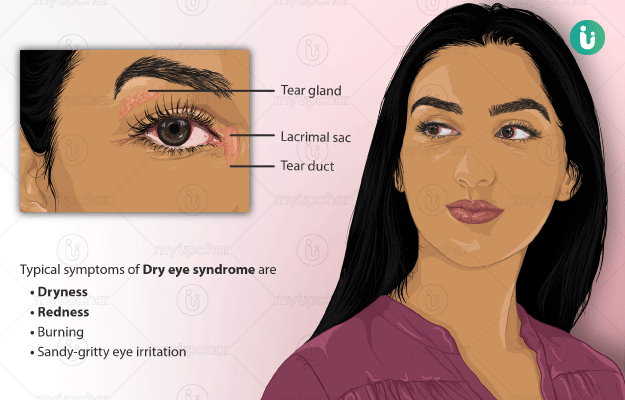What is Dry Eye Syndrome?
Dry eye syndrome, or the dry eye disease, is a fairly common condition in which an individual experiences discomfort in the form of dryness or irritation in the eyes because tears are not produced sufficiently or evaporate quickly.
What are the main signs and symptoms?
The symptoms of dry eye syndrome may vary in severity as mild or painful. Some of the symptoms are listed below:
- Dryness
- Soreness
- Itching
- Burning sensation
- Redness
- Temporary blurred vision that improves upon blinking
- Pain
- Watering
- Feeling of pressure behind the eyes
These symptoms may get worse if the person is in a dry environment or the surroundings are polluted. It may aggravate itching as well.
What are the main causes?
The primary cause of dry eye syndrome is the reduced production of tears, which leads to lack of moisture in the eyes. Other common causes of dry eye syndrome include
- Contact lens usage
- Hot climate
- Excessively windy climate
- Inflammation in the eyelids
- Medications, such as antihistamines, antidepressants, contraceptive pills, and diuretics
- Hormonal changes in conditions, such as menopause and pregnancy
The risk of having dry eye syndrome increases with age, and the syndrome tends to be more common in women than men.
How is it diagnosed and treated?
A physical examination by a doctor can help diagnose dry eye syndrome. Tests are generally not needed.
Dry eye can be prevented by avoiding dusty and smoky environments and wearing sunglasses to protect the eyes when in the sunlight. The treatment of dry eye syndrome can also vary according to the symptoms. For immediate relief, the doctor may prescribe:
- Eye drops
- Ointments to lubricate the eyes
- Medications to reduce inflammation
The doctor may also recommend diet changes, such as including more omega-3 fatty acids to keep the eyes lubricated.

 Doctors for Dry Eye Syndrome
Doctors for Dry Eye Syndrome  OTC Medicines for Dry Eye Syndrome
OTC Medicines for Dry Eye Syndrome


 Home Remedies for Dry Eye Syndrome
Home Remedies for Dry Eye Syndrome

















